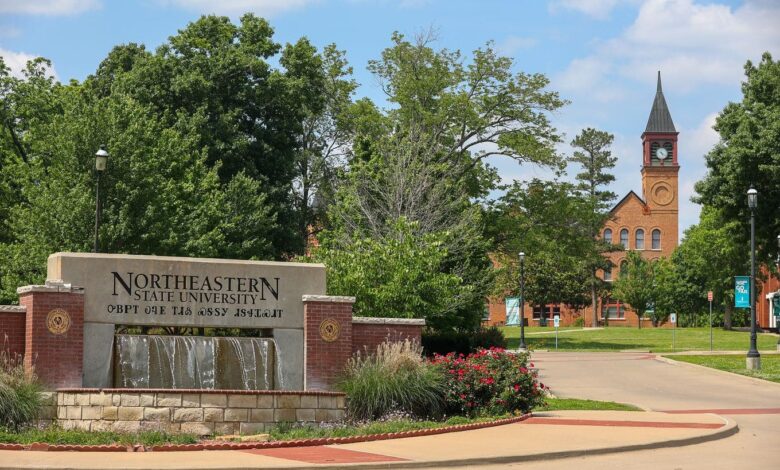Northeastern State University receives $1 million from Google to launch Cybersecurity Clinic

By John Dobberstein, Editor
When students graduate with a degree in cybersecurity it may be a good start, but it might not always be enough to break into the job market – even as U.S. employers are working desperately to fill thousands of crucial open positions.
Northeastern State University has had a cybersecurity program for several years that has been placing graduates in the cyber field. But the university expects to see even better results after learning it would receive a $1 million grant from Google.org to establish cybersecurity clinics in Tahlequah and Broken Arrow.
Northeastern State University is one of 15 new clinics set to launch in 2024 at higher education institutions across the country due to a collaboration from Google and the Consortium of Cybersecurity Clinics.
In addition to $1 million in Google.org funding, the tech company is offering Northeastern State University volunteer mentorship from Google employees, Google Titan Security Keys, and scholarships for the Google Career Certificate in Cybersecurity.
In collaboration with the Consortium of Cybersecurity Clinics, Google.org will provide funding, volunteers and in-kind support to establish the clinics from
Google’s Cybersecurity Clinics Fund to establish the NSU Cybersecurity Clinic.
“With this generous grant from Google, Northeastern State University can further power one of Oklahoma’s Top 100 critical occupations with workforce-ready cybersecurity professionals,” NSU President Rodney Hanley said in a statement. “This grant not only provides essential immersive learning opportunities for our students, but much-needed digital security for those within our communities and state.”
The new NSU Cybersecurity Clinic will give NSU students the opportunity to learn cybersecurity and artificial intelligence (AI) skills in an effective, hands-on manner while simultaneously helping to protect vulnerable organizations and critical infrastructure.
Cybersecurity clinics at higher education institutions provide free digital security services to under-resourced organizations, similar to how law or medical schools offer free community clinics, the university says.
According to the World Economic Forum’s 2024 Global Risks Report, cyber insecurity remains one of the top 10 global risks over the next 10 years.Currently, there are nearly 450,000 open cybersecurity jobs available in the U.S, including 4,191 in Oklahoma, and demand for cyber professionals is projected to grow 32% by 2033.
Dr. Stacey White, a retired law enforcement officer and Assistant Professor of Criminal Justice NSU, took over as coordinator for the university’s cybersecurity program a few years ago and says interest in the program has traditionally been strong, especially since it has concentrations for criminal justice, information systems or computer science.
But the funding will allow NSU to provide additional services to students, such as paid internships and additional training.
“In terms of recognition it will be good and I think the program will see an increase in enrollment. But that’s not the main motivation for this,” White says. “The main one is helping current students that we have.
“I’ve found that in cybersecurity, a degree is not always enough. Certifications and experience are a huge variable in the marketability of these students.”
White says the Google.org program has been ongoing for more than a decade and the amount of grant dollars has been increasing nearly every year, with the benefits making their way around the globe. “This is better than the alternative of being reactionary. This is trying to be proactive,” White says.
NSU had to learn about the consequences of cyberattacks personally last year when the university suffered an attack that took down the university’s website and IT systems. White says that incident isn’t related to NSU’s efforts to boost its cyber program.
“But these attacks are something to be concerned about,” he says. “This grant was an opportunity to make our students more marketable in the field.”
At NSU’s campuses in Broken Arrow and Tahlequah, a cyber expert on faculty, Dr. Rene Moquin, coordinated efforts to build cybersecurity labs for the program. Over the coming year, NSU will work to modify its program infrastructure and launch its in-field operations in the fall of 2025.
White says the labs will be “beefed up” to where students can not only do training but also practical applications with virtual machines, “where students will be warring with each other and training each other that way.”
White says he is putting together an advisory committee to help guide improvements and changes to the program and he wants to get local businesses involved in the mentoring and hiring process. Any clients who are open to students doing remote work can come to the labs to do it, he says.
White also wants to get local school districts, colleges and tech schools involved in the program.“If they have high school graduates that want to get into it and they meet the requirements as set by the committee, we can put them into the clinic as well. They can get a certificate and then we can pay them to go out in field for the companies that hire us,” he says.



